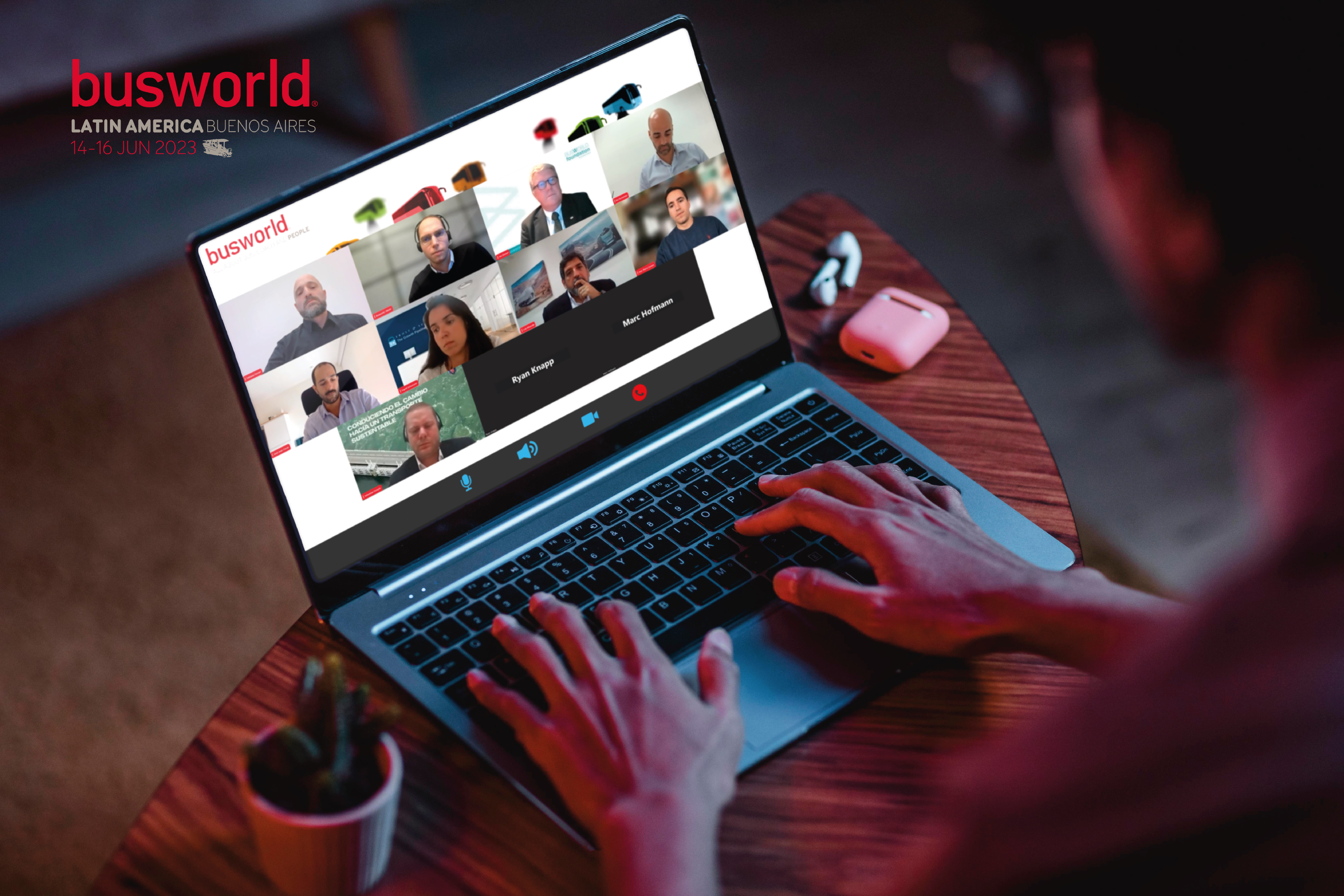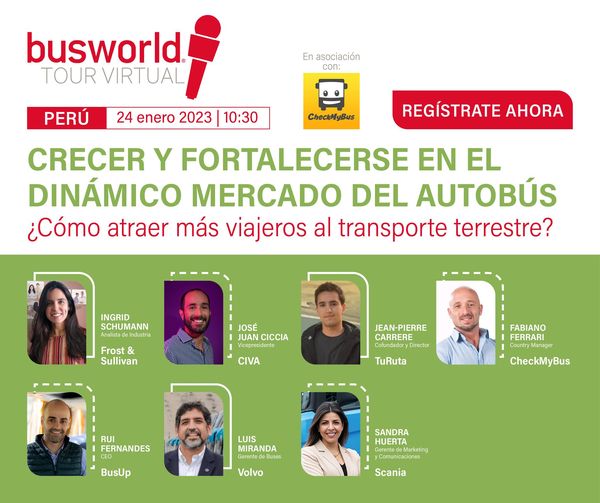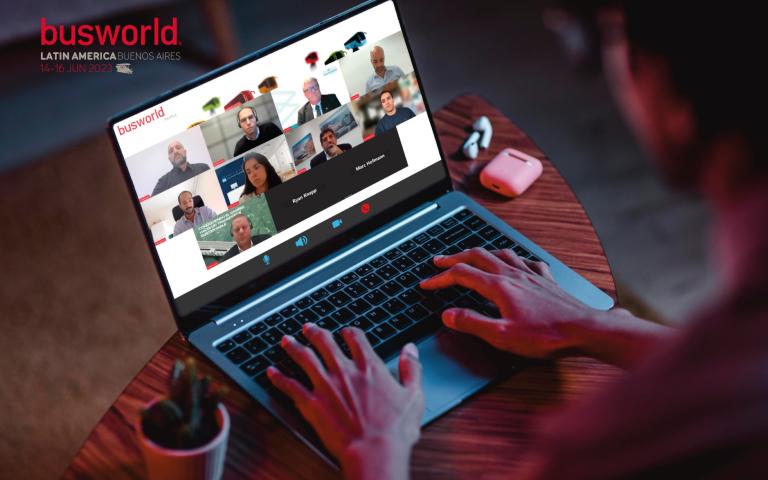The webinar "Busworld Virtual Tour in Latin America: Peru - How to attract more travelers to land transport?", was organized by Busworld and CheckMyBus on January 24. The objective of the event was to analyze the future of the bus market in Peru and how to attract more travelers to land transport in the country.
The event was attended by experts in the sector, including Ingrid Schumann, Industry Analyst at Frost & Sullivan, who gave a presentation on the current state of the bus market in Peru and its potential for future growth. Fabiano Ferrari, CheckMyBus Country Manager, acted as moderator and presented an overview of the current challenges and opportunities in the sector.

In addition, the webinar included the participation of José Juan Ciccia, Vice President of CIVA, Jean-Pierre Carrere, Co-Founder and Director of TuRuta, Rui Fernandes, CEO of BusUp, Luis Miranda, Bus Manager of Volvo Buses, and Sebastian Forsyth T. , Deputy Sales Manager of Scania. During the debate, the panelists discussed topics such as innovation in ground transportation, the importance of improving the traveler experience and how new technologies can help attract more travelers to the sector.
Overall, the webinar provided a detailed and up-to-date view on the future of the bus market in Peru and offered a platform for experts to discuss innovative solutions to attract more travelers to land transport in the country.
Ingrid Schumann, Industry Analyst, Frost & Sullivan, presented a small balance regarding the expectations of the Peruvian land passenger transport market, where she pointed out the following:
The bus market should increase at a CAGR of 11.8% from 2021 to 2030. The strong growth in 2022-2023 is attributed mainly to the recovery of urban and interprovincial transport due to a rebound in the tourism and entertainment industries. These were hard hit by curfews and mobility restrictions during the pandemic. Regarding the prospects for incentives and subsidies, the energy transition roadmap establishes two transition scenarios to reach a bus fleet with less carbon emissions, the "Increased Ambition" that stabilizes emissions, having 25% of the Fleet of buses with electric motor, and the "Green Development" with 58% of electric buses, both scenarios are for 2050, in passenger transport.
For her part, she assured that the ministry of energy and mines is developing a bill to promote the transition towards electric units. The regulation includes a reduction of the general sales tax for the production, import and/or commercialization of electrical units and their auto parts.
The regulations also contemplate the development of a scrap metal program and special promotions for the acquisition of electric buses, among other benefits.
Finally, she indicated that the key cities in this transition process towards electric buses and buses powered by natural gas in urban transport will be Lima and Callao.
José Juan Ciccia, Vice President, CIVA commented that the road infrastructure is to unite people. Transportation helps unite people and political instability forces service providers to suspend service, thus affecting thousands of people who need transportation to carry out their activities. He also indicated that at CIVA they focus on connecting people and that despite the difficulties, they always keep going, just as the buses do.
During the development of the webinar, Jean-Pierre Carrere, Co-founder and Director of TuRuta, conceptualized his company as a ground transportation platform that specializes in connecting its users with the most efficient and convenient public transportation services for their needs. They offer a wide range of options to travel to any destination and provide a more comfortable and safer travel experience. During the Busworld webinar, Jean-Pierre Carrere, Co-Founder and Director of TuRuta, shared his perspective on the importance of connectivity and how his platform contributes to improving users' travel experience.

Meanwhile, Fabiano Ferrari, Country Manager, CheckMyBus contributed to the debate that In order to grow and strengthen in the bus market it is now necessary to bring more passengers to land transport and For this it is necessary to use new technologies to generate new opportunities, smart offers and prices and that it empowers itself in the brand.
He indicated that the technology helps with data processing and planning for a flexible Network that is driven by a powerful interface that allows for much greater connectivity between the Client and the business.
In addition, he pointed out that it is very important to generate greater brand visibility on the Internet because otherwise, no matter how much technology is being implemented, this effort will not translate into real performance without a correct scope. "You have to multiply the audience using omnichannel strategies," he said.
For Rui Fernandes, CEO, BusUp, integration between transport companies is essential to generate a better understanding of the crisis and how to get ahead together.
He said that in BusUp there are two founders of the four who are Transport operators and each one has a fleet of almost 300 buses and the phrase when we started in 2015 they told me hey, one bus is better earning money than 10 losing money. What does this mean? If you have a line that goes empty and your competitor has a line that also goes empty, the result is that both lose money equally.
The airlines have solved this problem a long time ago, you buy in Iberia and end up traveling with another airline or you buy in Latam, you end up flying with Aeroméxico; they have already created a way of coexisting based on integration, then they are resolved internally, who gets this part, who gets this performance, but what doesn't make sense is inefficiency.
For Volvo, where do you find optimism to continue investing in transportation to acquire new units for passenger service?
Luis Miranda, Bus Manager, Volvo Buses, pointed out that: during the pandemic in Peru, the transport market fell by almost a third and interdepartmental transport was most affected. Just last year we raised very little, almost 500 Units, in the entire market for heavy-duty buses, without taking urban buses into account.
So in a market that is gradually recovering, but very slowly. Fleet purchases and renewals of the main operators are taking time because obviously there has been a very long stoppage. And this added to the social conflicts that have been taking place since the last year in Peru and with greater emphasis in the last two months, then it has generated many more difficulties.
But we have learned a lot from the pandemic, in fact this very webinar is part of what the pandemic has left behind because many things have become virtual and in the case of buses and individuals for the long-distance transport of people, we have bet that the units and fleets are with telemetry so that we, through this information, can help drivers improve their driving modes and thus help us to know, directly, the bus information and be able to improve some statistics and parameters to make it more profitable, but the other party is also the driver and through this information it has also helped us to be able to suggest improvements in driving, to prepare platforms for training with ways to improve, and this is something that the pandemic has given us. has driven.
For his part, Sebastian Forsyth T., Deputy Sales Manager, Scania, added that: "you have to understand that the vehicle industry is a technological industry that moves very quickly in very short periods of time, I think it is one of the The great lessons that the pandemic teaches us is that companies have to be extremely efficient and not only look at the short-medium term.
So somehow they have to be very well structured and with products that really help them run their operation.
You have to understand that a bus that is stopped is a bus that is not producing. I believe that fleet renewals and unit renewals often have to do with cost efficiencies and also looking for alternatives to Diesel, which is what we have been discussing in this space."
Without a doubt, a pleasant and enriching experience at the hands of our experts.
In the coming months, the Busworld Virtual Tour will pass through Colombia, Chile, Brazil and Argentina.

